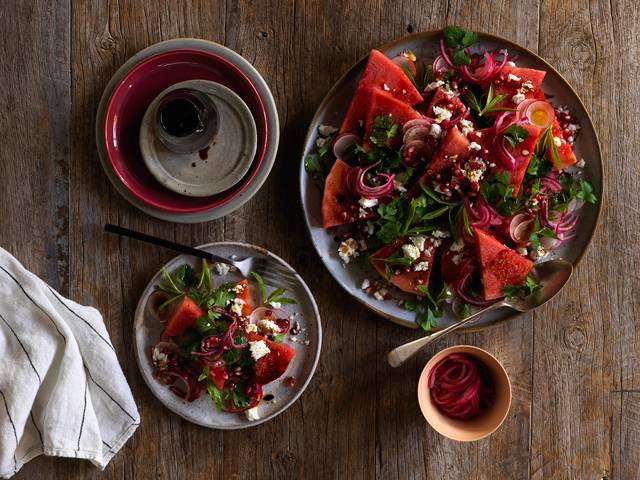Pickled Red Onion, Watermelon and Feta Salad

Pickled Red Onion, Watermelon and Feta Salad
Serves: 4-6
Ingredients
1/4 watermelon
200g packet of Greek feta, crumbled
1 large red onion
1 cup white wine vinegar (for pickling)
1 tsp castor sugar (for pickling)
1 pomegranate seeds removed
1/2 cup mint leaves
1/2 cup parsley leaves
4 radishes cut into thin disks
Olive oil, black pepper and pomegranate molasses to dress
Method
Begin by pickling the red onion 1 hour before you want to serve the salad. See page X for how to pickle onions.
Cut the watermelon into 4cm chunks and arrange over a large plate or platter. Drain the red onion onto kitchen towel, and scatter over the chunks of watermelon.
Sprinkle pomegranate seeds and the sliced radish over the watermelon.
Scatter the herbs and feta evenly over the whole dish.
Drizzle with olive oil and pomegranate molasses, and season with black pepper.
New Health Report Shows Onions Are A Nutritional Powerhouse
A new health report, covering the last 40 years of scientific research into onions, shows this humble pantry staple is also a nutritional powerhouse delivering a long list of health benefits.
The Australian Onions 2019 Health Report highlights onions contribute to improved gut health, greater immunity, improved mood, heart health, diabetes management, bone health and even a reduced risk of cancer.
This impressive list of health benefits is mainly attributed to the unique bundle of nutrients such as antioxidants, fructans (a prebiotic fibre), folate and vitamin C found in onions.
The authors of the new research report, Advanced Accredited Practising Dietitian Lisa Yates and Accredited Practising Dietitian Teri Lichtenstein, said onions are often overlooked as a contributor to the recommended five serves of vegetables a day, yet they can make an enormous contribution to our daily diet in terms of both taste and nutrition.
Report author Lisa Yates said one of the most interesting findings was that onions are one of the highest sources of polyphenol antioxidants, particularly quercetin, for Australian adults.
"Quercetin has antioxidant and anti-inflammatory effects which may help prevent the effects of ageing and chronic disease, has positive effects for heart health and diabetes, and also contributes to a healthier gut microbiome," Ms Yates said.
"In addition to being rich in quercetin, this particular antioxidant is also more easily absorbed by the body when sourced from onions, compared with other common food sources or supplements."
Key findings from the report include:
Gut health: Onions contain gut-loving fructans, a prebiotic fibre and fermentable carbohydrate that is resistant to digestion. Fructans feed the gut microbiome and promote the growth of healthy bacteria
Immunity and good mood: The unique combination of vitamin C and folate in onions helps keep the immune system fighting fit, supports brain function and reduces fatigue when eaten as part of a healthy diet
Weight: Onions are ideal for weight management, being only 106kJ per 75g serve or ½ an onion
Heart health: Onions are a heart healthy food with research showing they may improve cholesterol and blood pressure
Diabetes: Research has shown that, for people living with diabetes, consuming 100g of sliced onion significantly reduced blood glucose levels four hours after eating
Bone health: New research shows that onions may help older women protect their bones
Cancer risk: Emerging research shows people who eat more onions generally have reduced cancer risk compared to low or no onion eaters. The reason why is still being investigated, but it is thought to be due to inducing liver detoxification and inducing cancer cell death
With only seven per cent of Australian adults and five per cent of children meeting the recommended daily intake for vegetables, Ms Yates recommends Australian families include onions in their diet on a daily basis as a nutritionally superior way to help meet their vegetable target.
"Given these multiple health benefits, onions are an obvious choice to help bolster your daily veggie intake. Just half an onion counts as a one of your daily serves of vegetables," Ms Yates said.
"Onions are also great value and versatile. With three varieties to choose from (brown, red and white), and the myriad of ways they can be cooked, there really is an onion to suit all your everyday dishes and dietary preferences," Yates added.
To get the most out of your onions nutritionally, Lisa Yates' top five tips are:
Avoid peeling too many layers off your onions as the antioxidant quercetin levels are higher in the outer layers
Don't cut and store onions, cook and enjoy them soon after chopping
Avoid soaking onions but if you do add the liquids to cooking and consume as well
Use cooking methods with quick cooking times, such as stir fry, microwave and steam, and also enjoy them raw
Try fermenting onions with other vegetables
A summary of this new research report can be found on the new Australian Onions website along with recipes, tips and tricks for enjoying onions daily, as well as suggestions to reduce the tears when chopping onion.
To keep up to date with everything to do with Australian Onions, like us on Facebook and Instagram.
MORE





